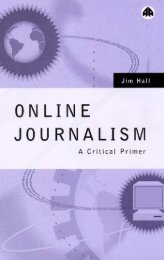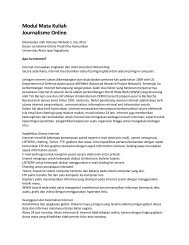1What is online journalism? - Ayo Menulis FISIP UAJY
1What is online journalism? - Ayo Menulis FISIP UAJY
1What is online journalism? - Ayo Menulis FISIP UAJY
Create successful ePaper yourself
Turn your PDF publications into a flip-book with our unique Google optimized e-Paper software.
60 Journal<strong>is</strong>m Online<br />
Select<br />
Calling selection a ‘stage’ could give the false impression that it <strong>is</strong><br />
part of a sequence. In fact, many of the elements of the journal<strong>is</strong>tic<br />
process should run concurrently. For example, the journal<strong>is</strong>t<br />
should constantly be sifting through ideas from the beginning and<br />
making selections, always guided by the paramount considerations<br />
of what will interest, inform and have an impact on the<br />
readership or audience.<br />
Journal<strong>is</strong>ts will sometimes make the job more difficult by<br />
delaying selection. They might follow too many leads and gather<br />
too much information. Th<strong>is</strong> undermines one of the most important<br />
responsibilities of the journal<strong>is</strong>t, that <strong>is</strong>, to choose what the<br />
reader will and will not see. The journal<strong>is</strong>t cannot carry out th<strong>is</strong><br />
function effectively if h<strong>is</strong> or her mind <strong>is</strong> clouded by too much<br />
information.<br />
Does the journal<strong>is</strong>t still have the same responsibility in the<br />
<strong>online</strong> world, where the user <strong>is</strong> free to choose from millions of<br />
documents, sites and sources? The answer <strong>is</strong> ‘Yes’, as:<br />
many of the documents posted on the Web are completed<br />
stories which will have required journal<strong>is</strong>ts to execute their<br />
traditional role, selecting what to include and what to exclude;<br />
it will often be the journal<strong>is</strong>t who selects additional information<br />
and data as part of any storytelling – again, choices will be<br />
made; and<br />
even when links to original sources are offered, these will have<br />
been chosen by journal<strong>is</strong>ts.<br />
Of course, if the <strong>online</strong> reader <strong>is</strong> unhappy with these choices, he<br />
or she can seek out additional perspectives, information and<br />
sources from the web on their own, for example, by using a search<br />
engine. But many won’t. Instead, as Steve Yelvington said, they<br />
will rely on the journal<strong>is</strong>t to be, if not the gatekeeper, at least the<br />
guide. And guides have to make choices.<br />
Writing and constructing your story are two other critical<br />
elements of the selection and presentation of news and information.<br />
The Web remains fundamentally a text-driven medium. So<br />
the core skills of direct writing and clear story construction are of
















